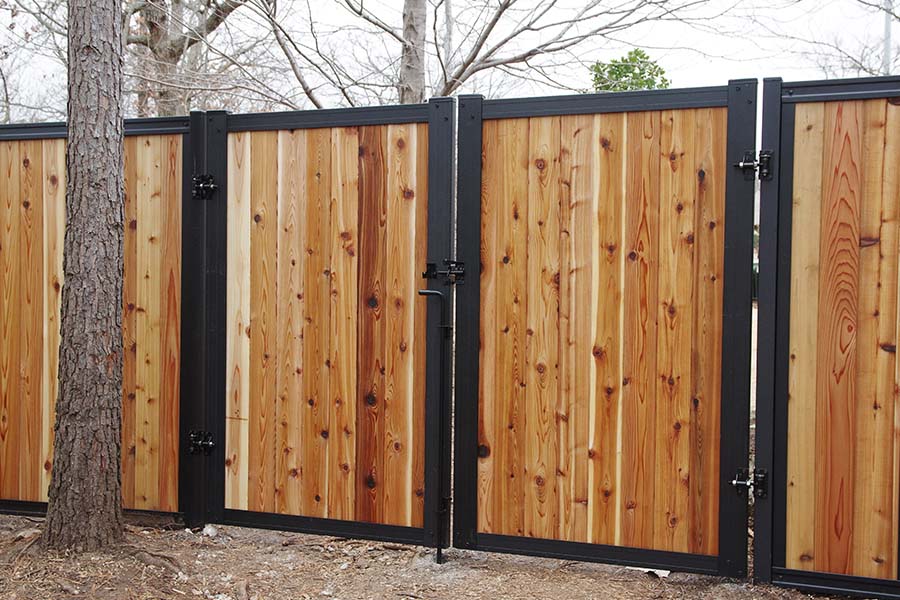All Categories
Featured
What Kinds Of Secure Fencing Products Are Readily Available for Residential and Commercial Projects?

When planning to set up a fence, choosing the best material is critical for satisfying the visual, useful, and budgetary requirements of your property. Whether for property or commercial usage, modern secure fencing choices provide a range of selections to match details needs. Right here's an in-depth appearance at one of the most typical fence materials available today.
- Wood Fence. Wood is a classic option for house owners seeking beauty and versatility. It works well for privacy fences, decorative designs, and boundary noting.
Key Benefits of Timber Secure Fencing:
Aesthetic Versatility: Can be crafted right into different layouts, consisting of picket, latticework, and board-on-board styles. Affordable: Offers price for lots of tasks, particularly smaller domestic ones. Adjustable: Quickly repainted or discolored to match a home's exterior. Downsides: Calls for routine maintenance, such as sealing and tarnishing, to secure against weathering and parasites.
- Vinyl Secure fencing. Plastic secure fencing has grown in appeal because of its streamlined look and minimal upkeep requirements. It's a terrific option for both household and industrial rooms.
Advantages:
Resilient and Resilient: Plastic withstands weather condition damages, insects, and fading. Easy Maintenance: A fast clean with soap and water keeps it looking excellent. Stylish Alternatives: Can be found in multiple colors and textures, some imitating natural wood. Considerations: The first expense is higher, but the long-lasting financial savings on maintenance can make it a wise financial investment.
- Chain-Link Fencing. Chain-link fence is a functional solution for securing big areas, commonly used in business, commercial, and entertainment buildings.
Advantages:
Price: One of one of the most affordable fence options. Sturdiness: Stands up to tear and put on, also in hard environments. Visibility: Gives a clear view while preserving security. Drawbacks: Restricted aesthetic allure and personal privacy unless integrated with slats or vegetation.
- Aluminum Fence. Light weight aluminum supplies an advanced look without jeopardizing on longevity. It's particularly prominent for attractive or safety functions.
Key Features:
Rust-Free: Ideal for humid climates or pool enclosures. Reduced Upkeep: Calls for marginal upkeep compared to iron or timber. Elegant Look: Usually made use of to mimic functioned iron without the substantial cost. Factors to consider: Not as strong as steel, making it less appropriate for high-security demands.
- Wrought Iron Secure Fencing. Recognized for its timeless elegance and longevity, functioned iron is a favored for high end homes.

Benefits:
Toughness and Safety And Security: Difficult to damage or bend, making it excellent for high-security applications. Adjustable Designs: Can be formed into intricate patterns for an one-of-a-kind appearance. Longevity: With correct upkeep, functioned iron can last for years. Downsides: Calls for normal upkeep to stop corrosion and is amongst the more pricey fence options.
- Composite Fencing. Compound fences combine timber fibers and plastic for a long lasting, environmentally friendly option.
Benefits:
Ecologically Friendly: Often made from recycled materials. Low Upkeep: Resistant to rot, parasites, and warping. All-natural Look: Mimics the appearance of timber without the maintenance. Downsides: Higher ahead of time expense compared to traditional timber fence.
- Bamboo Secure fencing. Bamboo is a sustainable and stylish option, especially for residential homes seeking an all-natural aesthetic.
Benefits:
Eco-Friendly: Bamboo is renewable and eco-friendly. Special Look: Includes a zen-inspired or exotic touch. Cost-Effective: Frequently cheaper than hardwoods. Downsides: Much less resilient in severe environments or against prolonged exposure to dampness.
- Steel Fencing. Steel fence offers unequaled strength, making it a best option for commercial and business requirements.
Features:
Sturdy Toughness: Handles substantial impacts and climate obstacles. Personalized Finishes: Powder layer boosts its look and long life. Safety and security: Suitable for areas calling for enhanced protection. Considerations: Higher cost and weight make it much less appropriate for small projects.
- Masonry or Rock Fence. For buildings seeking a irreversible and extremely resilient masonry, rock or choice fencing is a premium option.
Benefits:
Ultimate Longevity: Withstands extreme climate and lasts for years. Soundproofing: Blocks sound, making it optimal for city areas. Luxury Aesthetic: Uses an upscale look that complements high-end buildings. Disadvantages: High installment expenses and minimal flexibility in style modifications.
How to Choose the Right Material. When picking a secure fencing material, consider the following aspects:
Purpose: Do you need safety and security, privacy, or attractive charm? Spending plan: Some materials, like timber and chain-link, are cost-efficient, while functioned iron and rock come with a costs. Upkeep: Materials like vinyl and light weight aluminum are less complicated to keep, while wood and wrought iron need regular treatment. Climate: Some materials, such as bamboo or without treatment wood, are much less ideal for harsh climate problems. Verdict. Fence products today use a wide array of alternatives to suit various budget plans, features, and styles. Whether you focus on longevity, looks, or eco-friendliness, there's a product that will certainly fit your demands. By working with a professional fencing specialist, you can check out these options comprehensive and ensure a remarkable setup for your residential or commercial task.
Latest Posts
Uncover Montclare Auto Repair’s Leading Auto Repairs and Why Drivers Rely On Them
Published May 31, 25
1 min read
Explore Premier Auto Repair Services in Chicago – Keep Your Car Running Smoothly
Published May 27, 25
1 min read
Find Cost-Effective Auto Repairs with Montclare’s Limited-Time Service Specials
Published May 22, 25
1 min read
More
Latest Posts
Uncover Montclare Auto Repair’s Leading Auto Repairs and Why Drivers Rely On Them
Published May 31, 25
1 min read
Explore Premier Auto Repair Services in Chicago – Keep Your Car Running Smoothly
Published May 27, 25
1 min read
Find Cost-Effective Auto Repairs with Montclare’s Limited-Time Service Specials
Published May 22, 25
1 min read